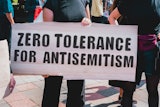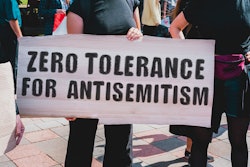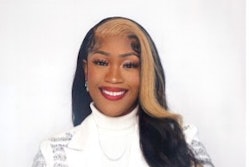Young Black Men Speak on College & Life
Black Issues In Higher Education talks to four young Black men who are currently attending college at campuses across the United States. Their educational, family and cultural backgrounds are diverse but their desire to advance themselves with a college education places them on a common mission.
By Ronald Roach
KENYAD ATENGA
From age 7 to when he turned 16, Kenyad Atenga watched his mother successfully juggle work, college and graduate school to eventually earn a master’s degree. When it came time for Atenga to consider college, he came to feel that he was floundering academically and knew that he could do better.
While his mother attended school, Atenga stayed with his grandmother who lived in a working-class neighborhood in south central Los Angeles. It was there that Atenga got exposure to the notorious gang life that’s vividly portrayed in movies and gangster rap music. After a friend of his got shot, Atenga withdrew from the gang scene altogether and began to seriously worry about his future.
His mother’s insistence that Atenga focus on getting into a four-year institution led him to abandon the idea of attending a junior college to play football. Even though he was later recruited by four-year Division I-A football institutions, Atenga decided to focus exclusively on academics and not worry about attaining a football scholarship.
A college junior now, Atenga settled on San Francisco State University where he is an international relations major and a computer science minor. He cites the presence of Black student organizations for providing him with the help he needed to be knowledgeable about the university and to meet all his academic requirements.
In the following passage, Atenga discusses what motivated him to go to college and the unity among Black males on his campus.
On Motivation
Kenyad Atenga: I decided that I was really going to college spring semester of my 12th-grade year. There were so many elements that influenced me but the two that stick in my head the most are my mother and my environment. These two things pushed me the hardest to make a decision to pursue higher education. I guess in many ways, my mother was a very good role model by her own actions in obtaining a college diploma when I was younger. Thus, watching my mom go through the steps kind of gave me a little ambition to take the next step after high school.
Secondly, my environment gave me ambition to go to school. At that particular time I felt as though there wasn’t anything for me in L.A. and something was driving me to get out. It seemed as though the people around me were pretty ambivalent about their futures and had the burden of the inner-city life on their shoulders as well.
On Campus Unity
There is a bit of unity among Black males on my campus. I feel we all have a mutual respect for one another. We all might not be in the same social crowd but for the most part we speak to one another. When you speak of unity, I’m thinking on a revolutionary scale. However, I think most of all we have a functional Black male campus community.
JAMES JOYCE
It seemed obvious to James Joyce, a junior journalism major at Ohio University, that attending college would represent a sure ticket to a rewarding career and a solid upper middle-class life.
Despite growing up in modest circumstances in Westminster, Md., a suburban bedroom community of Baltimore, Joyce says he found plenty of inspiration from his single mother and a few Black people in his overwhelmingly White community. Accorded respect by his Black male peers in high school, Joyce was dubbed the “protester” because of his assertiveness and willingness to probe and question authority.
Joyce’s desire to leave Maryland, study journalism and pursue a college track-and-field career led him to the Athens, Ohio, public university. Joyce credits his mother for being supportive of his desire to attend an out-of-state institution despite the financial strain it has placed on him and his family.
In addition to his studies, Joyce has excelled as a campus leader and participates in a wide variety of activities, including the Student African American Brotherhood (S.A.A.B.) academic support group.
In the following passage, Joyce talks about the dynamics of Black male/Black female interaction on his campus and the interaction of Black men among each other.
On MALE/FEMALE Relationships
James Joyce: In general on the Ohio University campus the females encourage the males who are already involved to stay involved. These males are usually perceived to be about their business and on top of things. The females generally take the key leadership positions in organizations and continue to be leaders in the classroom as well. Males on campus who are not involved do not get encouraged to become more involved; they simply become complacent with their position.
As far as mutual respect and healthy dialogue, I feel that the females do not demand the respect that they deserve. Often males feel that they can talk to many of the females any way they want. Healthy dialogue between males and females occurs during scheduled forums, but the most candid conversations occur in our cultural center between classes.
During these candid conversations, it is evident that females do not demand the level of respect that they deserve because the males will give their unadulterated opinion on how they feel. Relations could improve if males took more initiative on campus and took the key leadership positions and were more serious about their purpose in college. On the females’ side, if they respected themselves more and demanded respect from the males, it would yield more mature relations between the two groups.
On Motivation
I feel that if males had more positive and reachable role models they would respond to other males in more of an accurate manner. As far as motivation, it is difficult to motivate other males if they do not have a model to follow. As we can see in today’s society, the role models are often media-based and not personable. The key motivation seems to be money and status in today’s society. Academic achievement should come from within and should not be driven by external forces. There are very few role models for successful academic achievement and this makes it something unattainable for many males.
On LEadership
Leadership abilities are something that I feel are inherent and not something to be taught. Rather, they can be enhanced. I feel that there are many African American male leaders in our society, however due to the lack of positive role models, their abilities go to what they see modeled — sports, hip-hop culture and the thug game. This is why it is important for individuals who do “make it” and come from less than affluent backgrounds to give back to our community.
BRANDON RANDALL
Brandon Randall had not considered the possibility of attending an all-male institution until a basketball recruiter got the Williamsburg, Va. scholar-athlete to consider Hampden-Sydney College in Virginia.
The idea of attending Hampden-Sydney, which enrolls close to 1,000 undergraduate men each year, seemed farfetched to him at first. But visits to the campus and talks with school officials helped the star student realize the school was not just another institution who valued the high school basketball player solely for his prowess on the court.
Randall, who is a freshman, became convinced he could excel academically at the small private college. Though his college decision baffled his Black male buddies from high school, Randall credits his mother and father, who is a former college basketball coach, with providing him the guidance that enabled him to critically evaluate Hampden-Sydney as a college option. He is considering pursuing either engineering or economics as a major.
Though Randall feels being a student-athlete has helped him find warm acceptance among his White schoolmates, he is conscious of the challenges of being one of only 30 Blacks at the school.
In the following passage, Randall talks about the climate of attending a predominantly White, all-male college.
On confidence
Brandon Randall: I believe that attending a predominantly White all-male institution has helped me build confidence in myself. I think that in order to attend an all-male predominantly White institution one must have a lot of confidence to begin with. As an African American student in a predominantly White school, I think that a school of this type could hurt a Black student with little confidence because he would feel uncomfortable expressing his opinions in an environment with people he might not be able to relate to. A student who begins college with confidence in his abilities, however, has a different perspective. He understands that his opinions are very important because many times his experiences as a young Black male bring new insight to discussions.
ON MENTORING
I definitely think attending a predominantly White all-male college strengthened my interest in mentoring young Black kids and encouraging them to attend college. At a school like Hampden-Sydney, I feel saddened that there are so few Black students here. The classes are small, so you receive a lot of individual attention. Moreover, a degree from Hampden-Sydney usually is synonymous with success; there are countless CEOs, congressmen and successful doctors and lawyers. Yet Hampden-Sydney is only one of many schools that can provide a ticket for success.
Therefore, I believe that it is imperative for me to inform young Black kids of the importance of college. I think that being at a predominantly White institution increases the urgency to talk to younger Black students, for everyday at my school I see that for approximately every 97 White students making steps toward success there are only three students of color making them — that disturbs me.
AHMAD SHAKIR
Ahmad Shakir is coping with his mother’s death from cancer this past February as he completes his freshman year at predominantly Black Dillard University in New Orleans. Raised by his mother and grandmother in a low-income neighborhood in north New Orleans, Shakir was admitted to Dillard University on the condition that he enroll in a pre-freshman summer program at the school and maintain a 2.0 grade point average. Despite his family tragedy, Shakir appears to be on his way to successfully completing his first year in college.
Though he lacked stellar grades in high school, Shakir recognized that college offered him a way out off the streets of New Orleans. He has seen many of the young men in his neighborhood end up jobless, in menial employment or as drug dealers. While he continues to live with his grandmother and his younger sister in the community he has lived in for years, Shakir is determined not to let the distractions of the streets throw him off from achieving his goal of becoming a schoolteacher.
In the following passage, Shakir talks about the effect attending Dillard is having on his life.
ON CONFIDENCE
Ahmad Shakir: Going to college builds confidence that maybe I could compete in this fast-moving world. The confidence level is somewhat different than in high school because I can see that achievement in college is not as difficult as I thought it would be. I’ve learned to not procrastinate, how to prioritize and how to reach self-appointed goals. What I mean is that I’ve learned to follow my dreams and intuitions, and not someone else’s.
ON FRIENDSHIP
Some of my friends had attended college but had to return home for personal reasons. When they found out that I was going to attend Dillard, my friends were neither encouraging nor discouraging. It was simply another day in the “hood” with information to bring to the table. One friend replied, “Man, Dillard got them hoes.” They seem more enthusiastic about the selection of women rather than the significance of my going to college.
© Copyright 2005 by DiverseEducation.com















